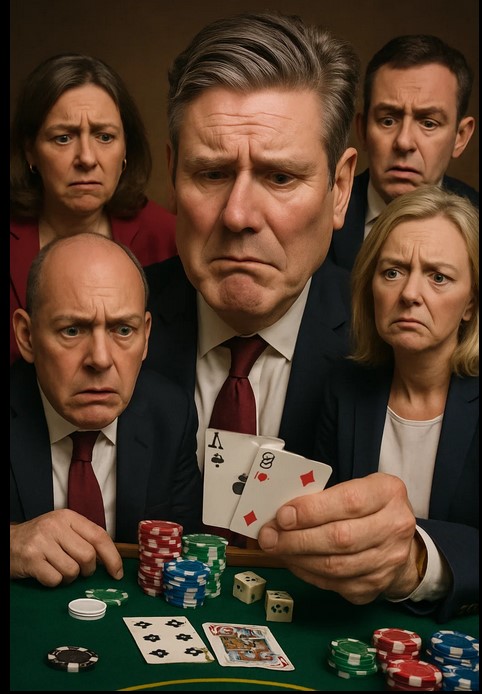Moral Panic at the Bookies: Why Westminster Thinks You’ll Self-Destruct Before the 8:15 at Wolverhampton
If you’ve ever placed a bet on the horses without immediately selling your house and joining a therapy group, congratulations — you are not the person gambling legislation is designed for. Unfortunately, that doesn’t matter, because to British politicians, you’ve already lost your moral footing somewhere between Coral and catastrophic ruin.
GAMBLINGSPORTHORSE RACING
Ed Grimshaw
5/13/20253 min read


From Whitehall to William Hill: Everyone's a Wreck, Apparently
There was a time — not so long ago — when the ability to weigh risk against reward was considered a basic tenet of adulthood. The pub punter knew his limits, the fruit machine addict was sadly rare, and the politician largely kept out of your wallet unless it was via tax, scandal, or the occasional expenses-funded patio heater.
But that Britain is gone. Now we live in a nation of moral mollycoddlers, where the assumption is that everyone placing a tenner on the 8:15 at Wolverhampton is five minutes away from destitution, a broken family, and a tearful call to Lorraine. The fact that most of us just want to make a drizzly Monday feel vaguely consequential is irrelevant. We are all, in the eyes of the Westminster class, too fragile, too thick, and too dopamine-addled to be trusted with our own bloody debit cards.
The real tragedy? They think this infantilising lunacy is compassion. That slapping "time to stop" pop-ups across your screen and banning bonus rounds is a moral victory, rather than a panicked attempt to look serious while the rest of the country slides off its axis.
Starmer's Virtue: Policy as Electoral Feng Shui
And who better to champion this new age of padded corners and soft restrictions than Sir Keir Starmer — the human embodiment of cautious legalese, now doing his best impression of a man with convictions.
But don’t be fooled. Starmer’s newfound love of hardline immigration rhetoric and hand-wringing over gambling harm has nothing to do with principle and everything to do with the polling wizardry of the Reform Party. Every time Nigel Farage clears his throat in a service station, Labour’s strategy office slams the panic button and rolls out another policy designed to stop Barry from Barnsley voting for a man in Union Jack socks.
It’s the same logic applied to gambling. It’s not about health. It’s not about fairness. It’s about optics — about looking "tough on harm" while sidestepping the hard stuff: poverty, mental health, community breakdown. Because those require money, thought, and courage — not slogans and a press release about stake limits.
And so, rather than challenge the root causes of compulsive behaviour, the political class leans into its favourite delusion: that the British public is a twitchy mob of overgrown toddlers, moments away from extinction every time they encounter a flashing graphic or Ray Winstone’s floating head.
Survival of the Fittest? Not in This Regulatory Zoo
The biggest irony in all this is that we are no longer governed as if we are free-thinking adults capable of bad decisions and personal growth. We are governed like an endangered species, one bad spin from extinction. “Protection” no longer means supporting the weak — it means treating the strong as if they were weak, just in case.
Forget survival of the fittest — we’re in the age of the mollycoddled median, where policy is designed not for the individual who knows his limit, but for an imagined cross between Oliver Twist and a FIFA Ultimate Team addict. Westminster has no faith in you. It sees you not as a participant in society, but as a liability with a broadband connection.
Gambling policy has now become the sharpest example of this trend. The crackdown is not based on credible evidence or targeted support. It’s blanket infantilisation masquerading as reform — the political equivalent of putting foam mats on a hill in case someone decides to roll down it in a shopping trolley.
The Real Gamble: Democracy on Autoplay
And while this great moral theatre plays out — with MPs pretending to care, lobbyists pretending to advise, and the Commission pretending to regulate — the actual problems spiral away into irrelevance. Britain doesn’t need a stake cap on 2am blackjack; it needs a functioning mental health service, a livable wage, and leaders who can distinguish between a vice and a way of life.
Because here’s the cruel joke: while we’re being scolded for the odd online flutter, the people doing the real damage are betting billions on failing policies, tinpot energy strategies, and ghost-train rail projects that have cost more than every problem gambler in Britain could possibly lose in ten lifetimes. The only addiction Westminster truly suffers from is its insatiable craving for control without responsibility.
Final Odds: Public Agency vs. Political Panic
So the next time a politician looks you dead in the eye and solemnly proclaims that “gambling harm must be tackled,” ask yourself this: are they trying to protect you from danger — or from making your own decisions?
Because this isn’t about harm reduction. It’s about electoral positioning, a dance to the rhythm of Reform, media panic, and middle-class guilt. It’s about treating survival of the fittest as a moral failure, and pretending mollycoddling is a substitute for competence.
They don’t want you to gamble — not because it might ruin your life, but because it reminds them you still have a choice, even if only between Burnley to score first and Rishi to resign second.
And in the minds of those who can’t be trusted with their own power, that’s the biggest risk of all.
